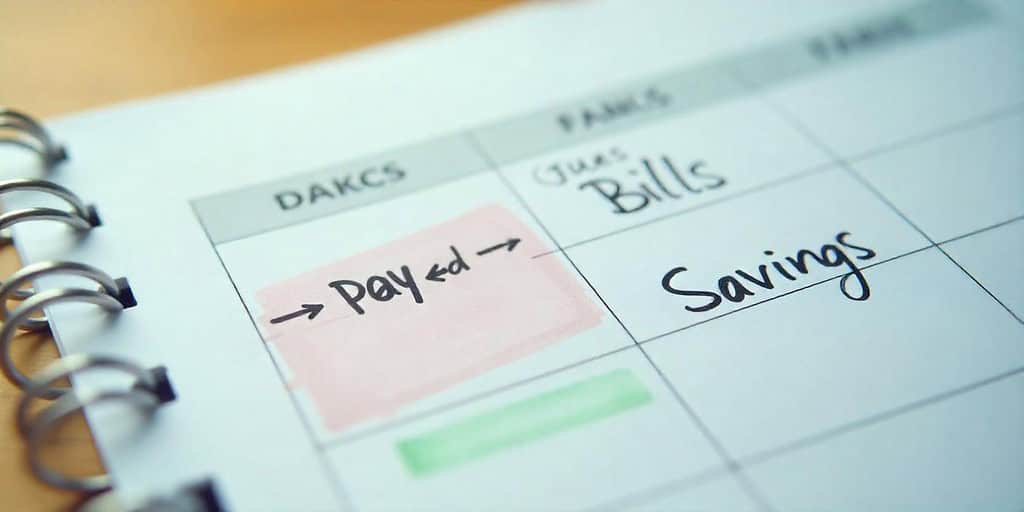Between school pickups, soccer practice, and endless loads of laundry, keeping track of your biweekly paycheck might feel like one more task on your already full plate.
But here’s the thing – small changes in how you handle those two monthly paychecks can add up to real savings for your family, without adding hours to your day.
These 10 practical tips fit into your actual life (yes, even with a toddler who refuses nap time), helping you build savings while managing your family’s needs.
As a mom, you’re already a pro at making things work.
Let’s take that same practical thinking to your biweekly budget and watch your savings grow.
Not too long ago, my kitchen table was constantly buried with bills, some opened and some not – a perfect picture of my scattered financial life.
With a biweekly paycheck, I felt like I was always playing catch-up, watching the first paycheck disappear into bills while stretching the second to somehow last until the next pay period.
But small changes in how I handled those two monthly checks made all the difference, giving me room to breathe and even save.
Key Takeaways
- Split your monthly bills into two manageable chunks
- Start with one small change at a time
- Create a simple system that fits your life
- Use those three-paycheck months strategically
- Remember: progress matters more than perfection
Making Biweekly Paychecks Work for Your Family
Think of your biweekly budget like meal planning for your money – it’s about knowing what you have and making smart choices about how to use it.
Those 26 paychecks a year (not 24) give you a chance to get ahead, especially during those magical three-paycheck months.
The trick isn’t just surviving between paychecks; it’s creating a system that puts you in control.

10 Practical Tips to Make Every Paycheck Count
1. Split Essential Bills Strategically
Three key steps to make this work:
a) List all monthly bills
b) Divide each bill in half
c) Assign each half to a specific paycheck
2. Create a Simple Bill Calendar
- Mark paydays in green
- List bill due dates and amounts
- Group bills by paycheck
- Add recurring expenses like groceries
- Include children’s activities and fees
3. Build Your Buffer Account
Start with these simple moves:
- Open a separate savings account
- Set up automatic transfers of $25-50 per check
- Don’t touch it unless truly necessary
- Increase the amount when possible
4. Master Three-Paycheck Months
Smart ways to use your “extra” check:
- 50% toward savings goals
- 30% for upcoming expenses
- 20% for family needs or wants
5. Automate Your Essential Savings
Break it down into manageable chunks:
- Emergency fund: $50/check
- Holiday savings: $25/check
- Family fun fund: $25/check
- Future goals: The remaining amount
6. Use the Half-Payment Method
This works best for:
- Mortgage/rent
- Car payments
- Insurance premiums
- Utility bills
- Childcare expenses
7. Create Specific Saving Goals
Label your savings clearly:
- “Back to School Fund”
- “Summer Camp Money”
- “Car Repair Buffer”
- “Holiday Gift Fund”
- “Family Vacation Savings”
8. Track Spending Simply
Choose your method:
- Notes app on your phone
- Simple budget app
- Paper notebook
- Monthly bank statement review
9. Plan for Annual Expenses
Yearly expenses to consider:
- Car maintenance
- Insurance premiums
- School supplies
- Holiday spending
- Birthday celebrations
10. Review and Adjust Monthly
Quick 15-minute check on:
- What’s working well
- Areas needing adjustment
- Upcoming expenses
- Savings progress
- New family needs

Making It Work in Real Life
Let’s break down how to put these tips into action with your real schedule. After all, the best budget is one you’ll actually use.
Finding Your Rhythm
Pick the system that matches your natural habits:
- Morning person? Review finances with your coffee
- Night owl? Set aside 15 minutes after kids’ bedtime
- Weekend warrior? Sunday planning sessions work great
- Digital fan? Use phone reminders and apps
- Paper lover? Keep a simple notebook handy
Common Challenges and Solutions
Time Crunch Solutions
- Use waiting time (sports practice, doctor’s office) for quick money check-ins
- Schedule bill-paying like any other important task
- Set up auto-pay for regular bills
- Keep tracking tools easily accessible
Unexpected Expenses When surprise costs pop up:
- Check your buffer account first
- Review flexible spending categories
- Adjust next week’s spending plan
- Get back on track with the next paycheck
- Don’t let one setback derail your progress
Making Adjustments
Your budget should flex with your family’s changing needs. Watch for:
- Seasonal changes in expenses
- Growing kids’ needs
- Changing family activities
- New opportunities to save
- Areas where you can cut back
Signs Your System Is Working
✓ Bills are paid on time without stress
✓ Your buffer account is growing
✓ You can handle small emergencies
✓ Savings goals are moving forward
✓ You feel more confident about money

Moving Forward
Remember, this is your family’s financial journey. Some weeks will go perfectly according to plan, while others might need adjusting.
That’s normal and expected. The goal isn’t to follow these tips perfectly but to use them in ways that make your life easier and your savings stronger.
Start Small
Choose one area to focus on this week:
- Track current spending
- Set up one auto-transfer
- Create your bill calendar
- Open a buffer account
- Plan for your next three-paycheck month
Keep Growing
As you get comfortable with one change, add another. Your confidence will grow with each small success, and those successes add up to real financial security for your family.
Would you like to take control of your biweekly budget? Start with just one of these tips this week. Pick the one that feels most doable for your current situation.
Small steps lead to big changes, and you’ve got this!
Frequently Asked Questions About Biweekly Budgeting
1. What if my bills are all due at the beginning of the month, but I get paid biweekly?
This is a common challenge for many families. The best approach is to gradually build a one-month buffer in your checking account. Start by saving a small portion of each paycheck until you have enough to cover those early-month bills. Meanwhile, contact your service providers – many are willing to adjust due dates to better align with your pay schedule. Remember, you’re not alone in this situation, and it’s okay to take small steps toward building that buffer.
2. How do I handle months with three paychecks?
Think of these extra paychecks as tools for getting ahead, not just extra spending money. Here’s a practical way to use that third check:
- Put 50% toward your key financial goals
- Save 30% for upcoming irregular expenses
- Keep 20% for immediate family needs
- Pro tip: Mark these months on your calendar now so you can plan ahead
3. What’s the easiest way to start biweekly budgeting when I’m already behind?
Start fresh from your next paycheck without worrying about past patterns. Begin with these simple steps:
- List all your bills and their due dates
- Note your next four paycheck dates
- Match bills to paychecks
- Start setting aside half of each major bill amount per paycheck
- Add just $5-10 per check to start building a buffer
4. How do I stick to a biweekly budget during busy seasons like back-to-school or holidays?
Planning for these busy times starts months ahead. Create separate “sinking funds” by setting aside small amounts from each paycheck. For example:
- Back-to-school: $20 per check starting in May
- Holiday gifts: $25 per check starting in July
- Summer activities: $15 per check starting in January
Remember, these amounts can be adjusted based on your family’s needs and budget.
5. What if my partner gets paid on a different schedule than I do?
Having mixed pay schedules can actually work to your advantage. Try this approach:
- Use one income for fixed expenses
- Put the other toward savings and flexible spending
- Create a shared calendar marking all paydays
- Coordinate bill payments between both schedules
- Keep open communication about timing and expenses
Pro tip: Some couples find it helpful to have three accounts: yours, mine, and ours, with the “ours” account handling all shared household expenses.
Your Questions Matter
Still have questions? That’s completely normal when adjusting to a new budget system. The key is finding what works for your unique family situation and schedule. Remember, you can always adjust your approach as you learn what works best for you.